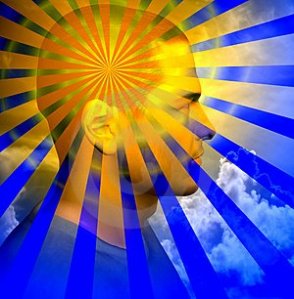

Last week I had dinner with a wonderful man named Peter Baumann. Peter is best known to the world as the keyboard player for the 1970s German group Tangerine Dream, and later founded the label Private Music. But in the last years, Peter has turned his attention completely towards the investigation of personal and collective awakening. He founded the Baumann Institute in 2004 to fund research to discover what is occurring in the neurologically, the psychology and the biology in a moment of radical Awakening.
We had dinner in a small Italian restaurant in San Francisco, the kind that, as soon as you walk in the door, America is left far behind, and you are in Europe. During our dinner Peter and I talked about what -- if anything -- is a reliable measurable indicator of awakening. Is there any external characteristic which people share in common in the realization of their deeper nature? We each came up with several candidates, and perhaps I will share those with you in another blog post. But for today, I want to report to you the very first one on Peter's list, which was to be comfortable with paradox. The conceptual mind wants to come to fixed conclusions about things. "We have no choice, it is all predetermined. Everything is happening on its own." That is one philosophical belief. "We have total choice and responsibility in everything we have ever create in our world." Another philosophical belief. This is what the mind does, it wants to reduce something down to a formula: the Truth.
One characteristic of awakening consciousness, which Peter feels is the most significant, is the capacity to embrace seemingly logical opposites simultaneously. We have no choice, we have choice: both true at the same time. Things are perfect as they are, the earth is crying out for help: both are true at the same time. Perhaps the most interesting and controversial of these paradoxical opposites has to do with the use of intention. I am going to be offering a free tele-seminar about this very topic this coming Thursday at 6pm.
When we consider the topic of intention, it's very easy to become fundamentalist. Trying to understand the role of intention through conceptual thinking, we generally fall into one of two camps. The first recognition, which is absolutely accurate and true, is that everything happens through intention. Every action begins with intention; every book that is written, every song that is composed, every building that gets built, every painting that gets painted, everything that has happened everywhere came through intention. In recognizing this seemingly undeniable fact, it is natural to seek out the most efficient way to use intention. Sometimes intention requires great struggle, perseverance, and determination, before it is translated into a tangible result. There are also ways that intention can operate at a much finer level, when the manifestation of a thought translates into a result almost effortlessly. The recognition of this possibility has spawned an entire industry, sometimes called "The Law of Attraction" or "Manifesting", and resulted in the movie The Secret.
The other end of the spectrum, equally undeniable and true, is sometimes called "non-dualism?" or "Advaita." It begins with an innocent recognition, but often translates into a rigid, fundamentalist philosophy. The innocent recognition is that when attention really goes to look for a "me," there is nothing there, just spaciousness, just presence. From this recognition, it becomes obvious that everything is happening on it's own, and there is no doer anyway. Thoughts arise on their own, feelings arise on their own, things happen when they need to. And within this recognition of no me, there is simultaneously the recognition of a kind of synchronicity, a benevolence which shapes our lives despite our efforts not because of them. When the innocence of this simple recognition translates into a philosophical perspective it becomes rigid, and any notion of doing, or responsibly, or intention, or desire gets a bad rap.
Over the weekend I stuck an invitation on Facebook for my upcoming Tele-seminar on Intention and got a flurry of these kind of fundamentalist responses: "it's not about wants getting fulfilled, it's about wanting what already is," and "Wanting is stressful."
The reality of our life, whether we like it or not, includes both ends of this spectrum. Everything is happening on its own and everything is flowing through intention. This is true of a truck driver in Milwaukee, it's true for Eckhart Tolle and Byron Katie. It's true of the President of a big nation and it is true of a beggar in Bombay. The very fact that we can use a word like "intention," and have a shared understanding of its meaning, points to the unavoidable fact that intention is a part of everyone's experience. And the very fact that we can speak of destiny, of surrender, points to another undeniable part of our experience. To be able to live comfortably in this paradox is freedom from the constrains of the mind, freedom from fundamentalism and the return to innocence.
Please join me this Thursday October 1st, 6pm PST, for an interactive seminar about intention. We will discover how the deliberate use of intention can easily obscure our natural state, but how it can equally deepen us into living awakening. We'll discover why the conscious use of intention very often doesn't work, and how it does. I'll share with you what many of my teachers over the years, including HWL Poonja, Urgyen Tulku, and many have said about intention.
